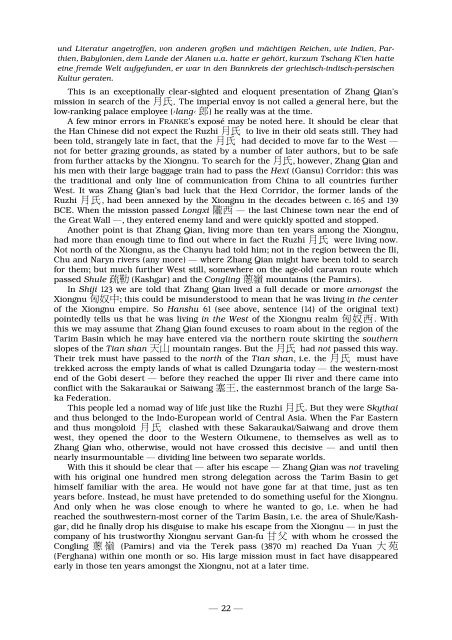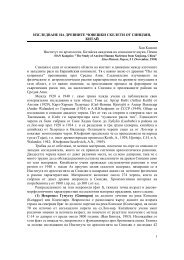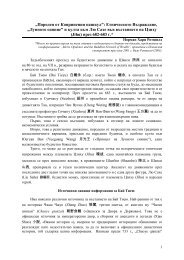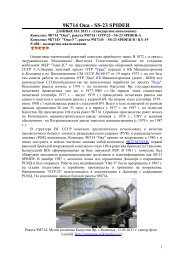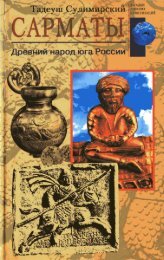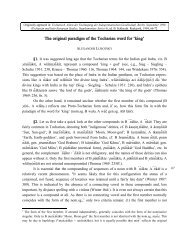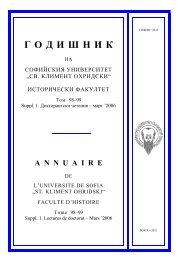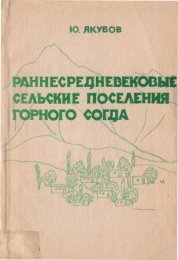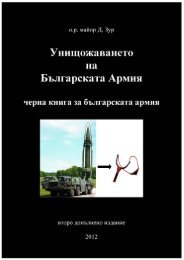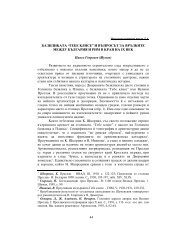You also want an ePaper? Increase the reach of your titles
YUMPU automatically turns print PDFs into web optimized ePapers that Google loves.
und Literatur angetroffen, von anderen großen und mächtigen Reichen, wie Indien, Parthien,<br />
Babylonien, dem Lande der Alanen u.a. hatte er gehört, kurzum Tschang K’ien hatte<br />
eine fremde Welt aufgefunden, er war in den Bannkreis<br />
der griechisch-indisch-persischen<br />
Kultur geraten.<br />
This is an exceptionally clear-sighted and eloquent<br />
presentation of Zhang Qian’s<br />
mission in search of the 月氏. The imperial envoy is not<br />
called a general here, but the<br />
low-ranking<br />
palace employee (›lang‹ 郎) he really was at the time.<br />
A few minor errors in FRANKE’s exposé may be noted here. It should be clear that<br />
the Han Chinese did not expect the Ruzhi 月氏 to live in their old seats still. They had<br />
been told, strangely late in fact, that the 月氏 had decided to move far to the West —<br />
not for better grazing grounds, as stated by a number of later authors, but to be safe<br />
from further attacks by the Xiongnu. To search for the 月氏, however, Zhang Qian and<br />
his men with their large baggage train had to pass the Hexi (Gansu) Corridor: this was<br />
the traditional and only line of communication from China to all countries further<br />
West. It was Zhang Qian’s bad<br />
luck that the Hexi Corridor, the former lands of the<br />
Ru zhi 月氏, had been annexed by the Xiongnu in the decades between c. 165 and 139<br />
BCE. Wh en the mission passed Longxi 隴西 — the last Chinese town near the end of<br />
the<br />
Great Wall —, they entered enemy land and were quickly spotted and stopped.<br />
Another point is that Zhang Qian, living more than ten years among the Xiongnu,<br />
had<br />
more than enough time to find out where in fact the Ruzhi 月氏 were living now.<br />
N ot north of the Xiongnu, as the Chanyu had told him; not in the region between the Ili,<br />
C hu and Naryn rivers (any more) — where Zhang Qian might have been told to search<br />
for them; but much further West still, somewhere on the age-old caravan route which<br />
passed<br />
Shule 疏勒 (Kashgar) and the Congling 蔥嶺 mountains (the Pamirs).<br />
In Shiji 123 we are told that Zhang Qian lived a full decade or more amongst the<br />
X iongnu 匈奴中; this could be misunderstood to mean that he was living in the center<br />
o f the Xiongnu empire. So Hanshu 61 (see above, sentence (14) of the original text)<br />
pointedly<br />
tells us that he was living in the West of the Xiongnu realm 匈奴西. With<br />
t his we may assume that Zhang Qian found excuses to roam about in the region of the<br />
Tarim<br />
Basin which he may have entered via the northern route skirting the southern<br />
slopes<br />
of the Tian shan 天山 mountain ranges. But the 月氏 had not passed this way.<br />
Their<br />
trek must have passed to the north of the Tian shan, i.e. the 月氏 must have<br />
trekked<br />
across the empty lands of what is called Dzungaria today — the western-most<br />
end<br />
of the Gobi desert — before they reached the upper Ili river and there came into<br />
conflict<br />
with the Sakaraukai or Saiwang 塞王, the easternmost branch of the large Sa-<br />
ka<br />
Federation.<br />
This people led a nomad way of life just like the Ruzhi 月氏. But they were Skythai<br />
and<br />
thus belonged to the Indo-European world of Central Asia. When the Far Eastern<br />
and<br />
thus mongoloid 月氏 clashed with these Sakaraukai/Saiwang and drove them<br />
w est, they opened the door to the Western Oikumene, to themselves as well as to<br />
Z hang Qian who, otherwise, would not have crossed this decisive — and until then<br />
nearly<br />
insurmountable — dividing line between two separate worlds.<br />
With this it should be clear that — after his escape — Zhang Qian was not traveling<br />
with<br />
his original one hundred men strong delegation across the Tarim Basin to get<br />
himself<br />
familiar with the area. He would not have gone far at that time, just as ten<br />
years<br />
before. Instead, he must have pretended to do something useful for the Xiongnu.<br />
And<br />
only when he was close enough to where he wanted to go, i.e. when he had<br />
reached<br />
the southwestern-most corner of the Tarim Basin, i.e. the area of Shule/Kash-<br />
g ar, did he finally drop his disguise to make his escape from the Xiongnu — in just the<br />
c ompany of his trustworthy Xiongnu servant Gan-fu 甘父 with whom he crossed the<br />
Congling<br />
蔥嶺 (Pamirs) and via the Terek pass (3870 m) reached Da Yuan 大苑<br />
( Ferghana) within one month or so. His large mission must in fact have disappeared<br />
early<br />
in those ten years amongst the Xiongnu, not at a later time.<br />
— 22 —


